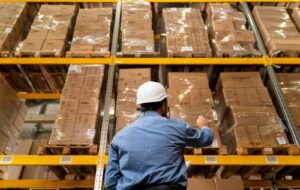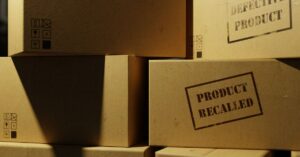Recall and reverse logistics services are essential. They support companies in effectively handling product recalls and refunds. Sustaining client happiness and brand reputation is imperative. In reality, these services are crucial to the supply chain for everything from product recalls to environmentally friendly operations.
At Unilogic Group, we understand the significance of recall and reverse logistics and offer discreet and efficient services tailored to our clients’ needs. Let’s dive into the world of reverse logistics and take a look at what Unilogic has to offer.

What Is Product Recall?
Reverse logistics, to put it simply, is the process of organizing a product’s return journey from end consumers back to the producer or retailer via the supply chain. This procedure is required to manage end-of-life products, handle consumer returns, deal with damaged or defective things, and even make it easier to refurbish, dispose of, or resell products.
By ensuring customer happiness and promoting sustainability through the ethical handling of returned or unwanted products, providing effective reverse logistics is a smart business strategy.

Reverse Logistics: Step By Step
The reverse logistics process involves five key steps to efficiently manage product returns:
- Start the Return Process: In accordance with established protocols, the company starts the return process when a consumer requests a return. This entails describing in detail how returned goods will be handled after clients get them. Inefficient handling results in waste and contamination, which can be reduced with a clearly defined method.
- Determine the Return Category: The merchandise is inspected to ascertain its next course of action after being returned. It can be necessary to recycle the product, restore it, or get it ready for resale.
- Maintain Product Flow: Minimize waste by promptly moving repairable items to the repair department and preserving returned goods.
- Repair or Salvage: Evaluate returned items to determine if they can be repaired. If repair is feasible, transfer them to the repair area. Otherwise, salvage any usable parts that can be resold or reused.
- Recycle Unsold or Repairable Items: Products or parts that cannot be repaired, reused, or resold should be directed to the recycling area for proper disposal.
By following these steps, organizations can effectively manage product returns, minimize waste, and contribute to sustainable practices in reverse logistics.

Types of Reverse Logistics
- Returns Management
Returns management is a crucial part of reverse logistics, focusing on handling regular customer returns efficiently and smoothly. This process aims to provide a seamless experience for customers, contributing to enhanced customer loyalty and a positive brand image.
- Return Policy and Procedure
A company’s return policy and procedure (RPP) establishes the guidelines for accepting and managing customer returns. It serves as a standard against which all returns are measured and should be consistently adhered to by both customers and employees. Keeping these policies visible and easily accessible to customers promotes transparency and trust.
- Remanufacturing or Refurbishment
Remanufacturing and refurbishment involve reconditioning returned products to prevent organizations and retailers from incurring losses due to defective items. By refurbishing products, businesses can recover value from returned goods and minimize waste.
- Packaging Management
Effective packaging management allows organizations to reuse packaging materials, reducing waste and saving costs associated with new packaging for returned items. Reusing packaging materials aligns with sustainability goals and promotes responsible resource management.
- Unsold Products
Reverse logistics for unsold products involves returning items from end users or fulfillment centers back to manufacturers. This process is typically triggered by factors such as delivery refusal, poor sales performance, or other inventory management considerations.
- End of Service Life (EOL)
Products that reach the end of their useful life need to be returned for proper environmental disposal or recycling. Manufacturers must manage EOL products responsibly to minimize environmental impact and comply with sustainability regulations.
- Delivery Failure
In cases of delivery failure, undeliverable products are returned to fulfillment centers for resolution. Efficient organizations can address delivery issues promptly by identifying and correcting the root cause, ensuring successful product delivery upon reshipment.
- Rental Equipment
Rented or leased equipment is returned to manufacturers at the end of the agreed-upon term. Manufacturers then determine whether to dispose of, recycle, or redeploy the returned equipment based on its condition and potential reuse.
- Repair and Maintenance
Certain products, such as consumer electronics, may be returned for repair or warranty services. Companies manage repair and maintenance requests to uphold product quality standards and ensure customer satisfaction with their purchases.

Why Choose Unilogic Group for Recall Logistics in Chicago?
At Unilogic Group, we specialize in recall and reverse logistics services, offering comprehensive solutions designed to protect our clients’ brand reputation and ensure regulatory compliance.
Unilogic Reverse Logistics Case Study
The subject of supply chain management is always changing, and sudden, unanticipated developments might cause established techniques to fail. Businesses need flexible partners who can create innovative ways to handle challenging situations.
One of our clients specializes in producing amenity travel kits for first-class and business travelers. These kits are carefully prepared and include various essential items like sleeping masks and toothbrushes. Unfortunately, a key component of these kits, a hand sanitizer, became unusable due to FDA restrictions placed on its manufacturing facility. This situation resulted in over 1,000,000 kits being rendered unusable while already in transit to the airline.
To salvage these kits and prevent significant losses, our team at Unilogic devised a solution. We intercepted the shipments at the rail ramp and transported them to our warehouse. Here, our dedicated team meticulously unpacked each kit, removed the non-compliant hand sanitizer, and repackaged the kits with new plastic wrapping. We developed an efficient protocol and trained our warehouse crew to expedite this process, ensuring timely delivery of the corrected kits to the airline.
This scenario emphasizes the value of agile supply chain management and the necessity of creative problem-solving to get beyond unforeseen obstacles in the fast-paced corporate world of today. At Unilogic, we’re dedicated to providing customized solutions that enhance our clients’ success and adjust to changing market situations.
Transforming Reverse Logistics Challenges into Solutions
In summary, supply chain management requires both recall and reverse logistics, particularly in a bustling metropolis like Chicago. At Unilogic Group, we provide thorough recall logistics services that are intended to safeguard the safety of our customers’ consumers and preserve the integrity of their brands. Businesses may handle product recalls with confidence and maintain their standing in the industry by using our tactful and effective approach.
Unilogic Group is the go-to partner for Chicago firms looking for dependable recall and reverse logistics solutions. Reach out to us right now to find out more about our offerings and how we can help with your recall management requirements.


